Europe is renowned worldwide for its diverse cultural heritage, much of which comes alive through colorful festivals and celebrations held throughout the continent. From Spain’s La Tomatina food fight to Scotland’s Edinburgh Festivals showcasing comedy, books, music, and more, Europe has something for everyone. The festivals highlighted in this article capture the richness and excitement that embodies Europe. Whether you’re looking to party at Munich’s Oktoberfest or soak in the midnight sun during St. Petersburg’s White Nights, these major European festivals planned for 2024 deliver memorable experiences you won’t find anywhere else. With amazing music, food, dance, and culture, Europe’s top festivals let you dive into centuries of tradition in one lively destination.
Table of Contents
Here’s a short list of some of the best and most famous European festivals you might consider visiting. Remember to check the specific dates and any travel restrictions or requirements before planning your visit. Additionally, these festivals can attract large crowds, so it’s a good idea to plan accommodation and tickets well in advance.
- Carnival of Venice (Italy) – January 27 to February 13, 2024. Known for its elaborate masks and costumes, this carnival takes place in Venice in the lead-up to Lent.
- St Patrick’s Day (Ireland) – March 17, 2024. St. Patrick’s Day is Ireland’s national holiday, featuring parades, concerts, and various festivities, especially in cities like Dublin and Cork.
- Cannes Film Festival (France) – May 14 to 25, 2024. One of the most prestigious film festivals in the world, held annually in Cannes, showcasing a selection of new films from around the globe.
- Glastonbury Festival (United Kingdom) – June 26 to 30, 2024. One of the largest music and performing arts festivals in the world, Glastonbury offers a diverse lineup of artists across various genres.
- Roskilde Festival (Denmark) – June 29 to July 6, 2024. One of the largest music festivals in Europe, known for its focus on activism and sustainability, is held near the city of Roskilde.
- Running of the Bulls (Spain) – July 6 to 14, 2024. Taking place in Pamplona, this festival is famous for the running of bulls through the streets, as part of the larger San Fermín festival.
- Sziget Festival (Hungary) – August 7 to 13, 2024. A week-long music festival held on the Hajógyári Island in Budapest, featuring a diverse lineup of artists and performers.
- Edinburgh Festival Fringe (United Kingdom) – August 2 to 26, 2024. The world’s largest arts festival, showcasing a wide variety of performances including theatre, comedy, music, and dance.
- La Tomatina (Spain) – August 28, 2024. This unique festival involves a massive tomato fight in the town of Buñol, near Valencia.
- Oktoberfest (Germany) – September 21 to October 6, 2024. Held annually in Munich, Oktoberfest is the world’s largest Volksfest (beer festival and traveling funfair).
- Bonus: White Nights Festival (St. Petersburg, Russia) – Dates typically from late May to mid-July, with specific events throughout. Held during the summer months when the sun barely sets, this festival features a series of cultural events, including ballet performances, concerts, and street festivals.
Carnival (Venice, Italy)
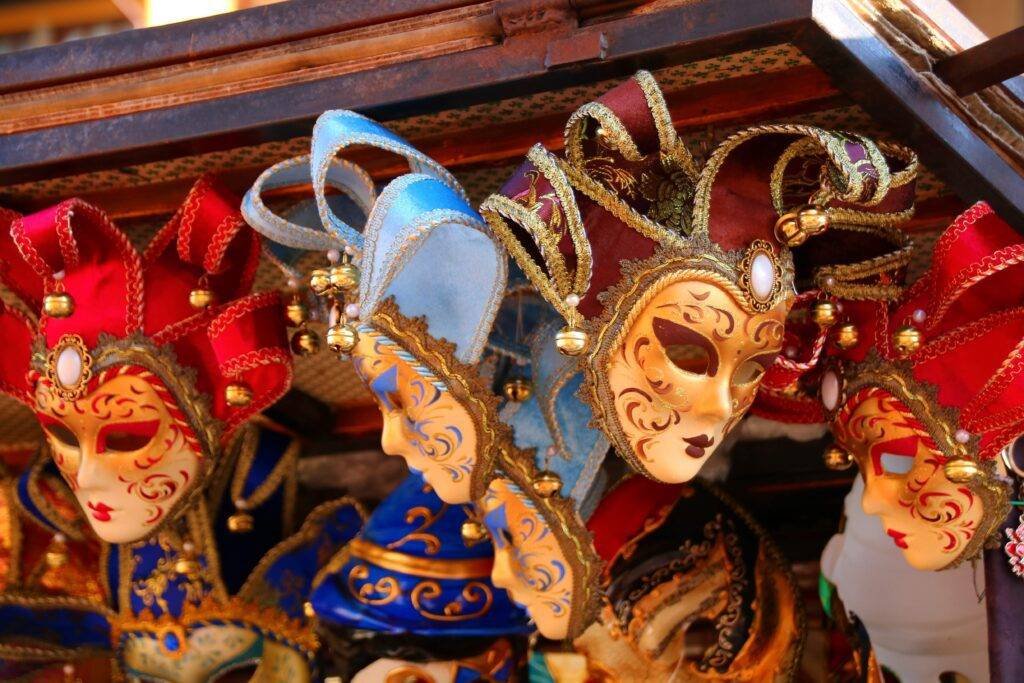
Our top pick among the European Festivals is none other than the Venice Carnival. One of the most famous and colorful festivals in Europe. It has a long and rich history dating back to the 13th century.
The highlight of the Venice Carnival is the elaborate masks and costumes worn by revelers. The tradition began centuries ago when Venetians wore masks during the Carnival season to liberate themselves before Lent. Masks allowed people to engage freely without the constraints of class, gender, or social identity.
Over time, mask-making in Venice became a prized art form. Creative and intricate masks and costumes were designed to impress and outdo one another. Common designs seen today include the Plague Doctor mask with a long beak, the Volto mask exhibiting perfect human features, the Moretta mask held in place without straps, and the Medico Della Peste with a crow-like beak.
During the Carnival, thousands take to the streets in creative garb and masks, socializing, dancing, and partaking in events. The costumes and pageantry transport revelers back to an era of intrigue and anonymity. Today, the masks and costumes remain centerpieces of the Carnival, showcasing Venetian craftsmanship and allowing anyone to embrace mystery.
For more info about the Venice Mask Festival, please check Everything You Need To Know About Venice Carnival: FAQs Inside! and Venice Mask Carnival 2024, Everything You Need to Know.
St. Patrick’s Day (Dublin, Ireland)
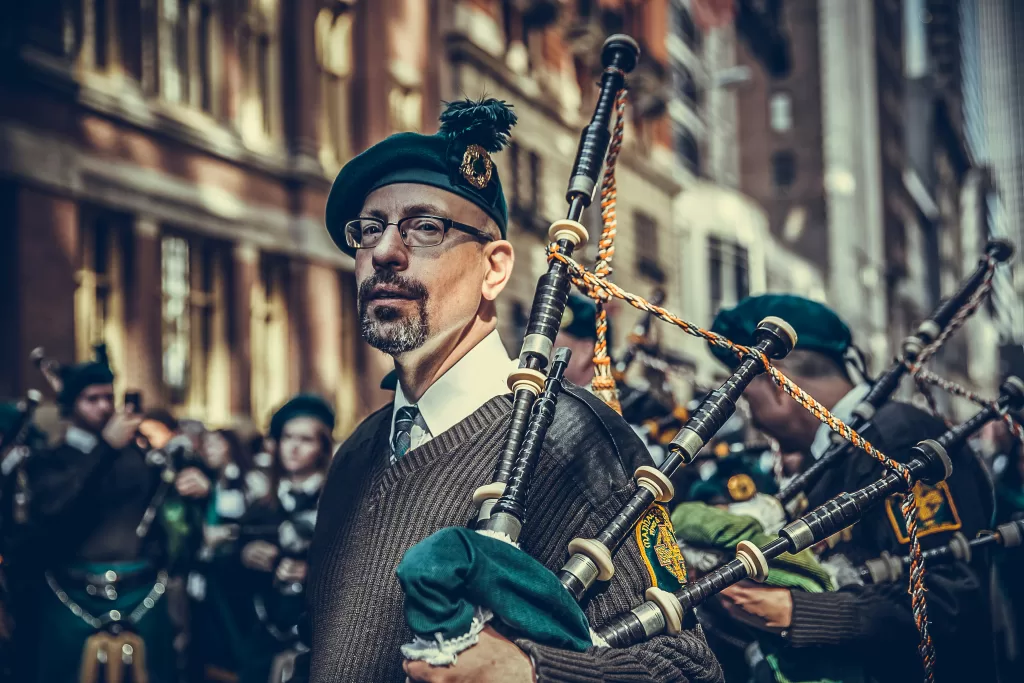
Our second choice among the top European Festivals is St. Patrick’s Day. St. Patrick’s Day is one of Ireland’s most celebrated festivals. It is held annually on March 17th to honor St. Patrick, the patron saint of Ireland. St. Patrick is credited with bringing Christianity to Ireland in the 5th century AD. According to legend, he used the three-leafed shamrock plant to explain the Holy Trinity concept to the pagan Irish.
St. Patrick’s Day celebrations involve public parades, festivals, céilís (traditional Irish social gatherings with folk music and dancing), and the wearing of green attire or shamrocks. The St. Patrick’s Festival in Dublin is a multi-day celebration featuring parades, concerts, outdoor theater productions, and fireworks shows. Public buildings and landmarks like the National Museum of Ireland, National Gallery of Ireland, and Christ Church Cathedral are specially illuminated in green for the festivities.
The tradition of the St. Patrick’s Day parade began in the United States, when Irish immigrants marched to honor their heritage. Ireland’s first St. Patrick’s Day parade was held in Dublin in 1931. Today it is one of the largest festivals held in Dublin every year. St. Patrick’s Day is celebrated as both a religious and cultural holiday in Ireland. While it is a national holiday, many international visitors join in the festivities in cities like Dublin and Belfast.
Cannes Film Festival (France)
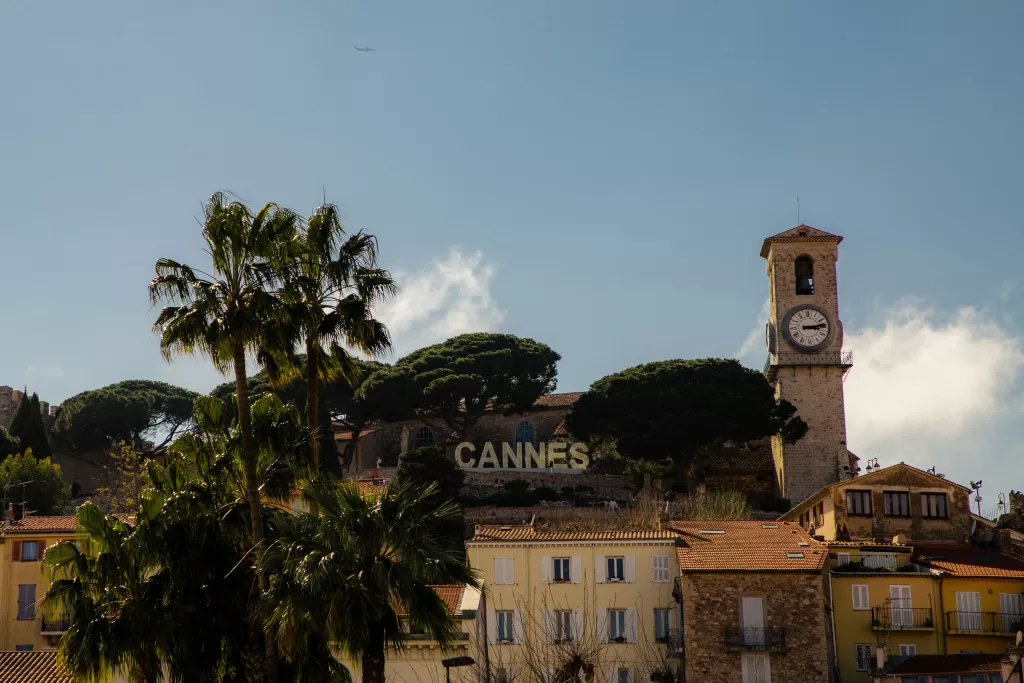
Our third choice among the top European Festivals is The Cannes Festival. The Cannes Film Festival is one of the most prestigious and glamorous events in the international film industry. Held annually in the picturesque French Riviera town of Cannes, this festival celebrates the art of cinema with a showcase of some of the finest films from around the world. In 2024, the festival is scheduled to take place from May 14 to May 25.
The Cannes Film Festival, founded in 1946, is renowned for its red carpet premieres, star-studded events, and the prestigious Palme d’Or award, which is given to the best film of the official competition. The festival attracts filmmakers, actors, industry professionals, and film enthusiasts from across the globe, making it a hub for networking, deal-making, and artistic appreciation.
During the festival, attendees have the opportunity to watch a diverse selection of films, including world premieres, international productions, and avant-garde cinema. Screenings are held in various venues, including the iconic Palais des Festivals et des Congrès, which serves as the festival’s central hub.
In addition to film screenings, the Cannes Film Festival features press conferences, panel discussions, and masterclasses with renowned filmmakers and industry experts. There are also numerous parties, receptions, and galas held throughout the festival, providing attendees with ample opportunities for networking and celebration.
One of the highlights of the Cannes Film Festival is the red carpet ceremonies, where celebrities and filmmakers make grand entrances before attending premieres and screenings. The festival’s closing ceremony, where the prestigious Palme d’Or and other awards are presented, is a highly anticipated event.
Another highlight is the Marché du Film (Film Market), which runs concurrently with the festival and serves as a marketplace for buying, selling, and promoting films. The Marché du Film attracts industry professionals seeking distribution deals, financing opportunities, and collaborations.
Glastonbury Festival (United Kingdom)

Our next pick of the top European Festivals is The Glastonbury Festival. It is a legendary five-day music and performing arts extravaganza that takes place in the idyllic countryside of Somerset, England. Renowned for its eclectic lineup, vibrant atmosphere, and commitment to sustainability, Glastonbury is one of the world’s most iconic and beloved music festivals. In 2024, the festival is scheduled to take place from June 26 to June 30.
Established in 1970, Glastonbury has grown from humble beginnings as a small gathering of music enthusiasts to a cultural phenomenon that attracts over 200,000 attendees each year. The festival is held on a vast site at Worthy Farm, featuring multiple stages, performance areas, art installations, and themed zones spread across hundreds of acres.
Glastonbury is renowned for its diverse and star-studded lineup, which spans multiple genres including rock, pop, electronic, hip-hop, folk, and world music. Past headliners have included iconic artists such as David Bowie, Beyoncé, Radiohead, and Adele, as well as up-and-coming acts from around the globe. In addition to music, the festival also showcases a wide range of performing arts, including theater, circus, comedy, and spoken word.
One of the defining features of Glastonbury is its unique and inclusive atmosphere, characterized by a sense of community, creativity, and open-mindedness. Festival-goers are encouraged to embrace the spirit of Glastonbury by expressing themselves through costumes, art projects, and interactive installations. The festival’s diverse crowd includes people of all ages, backgrounds, and walks of life, united by their love of music and shared experience.
Roskilde Festival (Roskilde, Denmark)

Our number five pick of the top European Festivals is the Roskilde Festival, one of the largest music festivals in Europe and has been held annually since 1971 in the town of Roskilde, Denmark, located 30 kilometers west of Copenhagen. It runs over 4 consecutive days and has an average attendance of over 85,000 spectators. The festival has a strong tradition of promoting music of all genres as well as a variety of cultural activities and political activism.
The festival has a rich history and has hosted legendary artists over the years such as Bob Marley & The Wailers, David Bowie, Jimi Hendrix, Nirvana, Pearl Jam, Guns N’ Roses, Metallica, Prince, Red Hot Chili Peppers, Rage Against the Machine, Arctic Monkeys, Coldplay, Bjork, Green Day and the Chili Peppers. Apart from musicians, world-famous speakers and activists like Nelson Mandela, Mikhail Gorbachev, and Salman Rushdie have graced the main stage.
The festival features Scandinavia’s largest selection of musical genres, with rock, pop, urban, metal, and electronic music represented every year on the main stage. Jazz, folk, and blues music are well-represented too along with world music from Africa, India, Latin America, and the Middle East. Apart from prominent international acts, the festival promotes upcoming Scandinavian artists and each year showcases the best of Nordic music.
Roskilde Festival is not just about music. It is an idealistic festival with an overall theme of human rights, sustainability, and community that encourages reflection on contemporary issues. The festival-goers are avid volunteers and the non-profit event is organized jointly by volunteers and staff. All profits are donated to charities supporting humanitarian and cultural work to promote understanding between people. The festival promotes values of tolerance, openness, community, and activism.
Running of the Bulls (Pamplona, Spain)
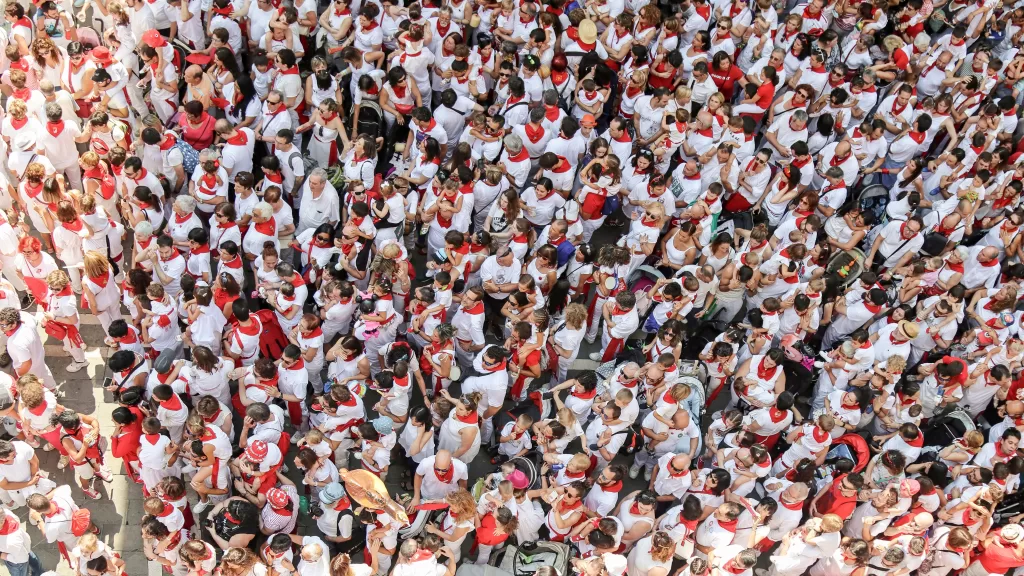
Can’t complete the list of top European Festivals without The Running of the Bulls festival. Festival takes place every year in Pamplona, Spain during the San Fermin festival, which runs from July 6-14. The running of the bulls event itself takes place each morning at 8 am from July 7-14, when brave (or foolish, depending on your viewpoint) participants run ahead of a herd of bulls charging through the streets towards the bullfighting arena.
This tradition dates back hundreds of years to the early days of bullfighting in Spain. The bulls that run through the streets are later used in bullfights, the traditional Spanish spectacle in which bullfighters (matadors) perform routines and attempt to maneuver the bull to eventually kill it with a sword. This practice, along with the running of the bulls, has long been controversial due to concerns about animal cruelty. Bullfighting has been banned in many parts of Spain but continues in some cities like Pamplona.
The Running of the Bulls attracts thousands of participants and spectators each year, who either take part in the run itself or watch from protected areas along the route. It gained worldwide fame from the 1926 Ernest Hemingway novel The Sun Also Rises and continues to draw thrill-seekers and daredevils from around the world. However, injuries and occasional fatalities also occur most years during the run from falling or collisions with the large bulls charging through crowded streets.
Opponents have campaigned to abolish this event due to the high risks for humans and the cruelty to the bulls forced to run and later killed in the arena. Supporters argue it upholds an iconic cultural tradition and provides economic benefits from tourism. The debate persists around holding this famous but contentious festival.
Sziget Festival (Hungary)

Another important one on the European Festivals list is The Sziget Festival. It is one of Europe’s largest and most diverse music and cultural festivals, held annually on the picturesque Hajógyári Island in the heart of Budapest, Hungary. Known for its eclectic lineup, vibrant atmosphere, and immersive experiences, Sziget offers a unique blend of music, arts, and entertainment that attracts festival-goers from around the world. In 2024, the festival is scheduled to take place from August 7 to August 13.
Founded in 1993, Sziget has evolved from a small student event into a week-long extravaganza that showcases a wide range of musical genres, performing arts, and cultural activities. The festival takes place on a sprawling island oasis situated in the Danube River, providing a stunning backdrop for its diverse array of stages, venues, and installations.
Sziget boasts an impressive lineup of international headliners, emerging artists, and local talent across multiple stages and genres. From rock, pop, and electronic music to world music, hip-hop, and folk, the festival caters to a wide range of musical tastes and preferences. Past performers have included global superstars such as Arctic Monkeys, Kendrick Lamar, Rihanna, and The Chemical Brothers, as well as up-and-coming acts from Hungary and beyond.
Cultural Experience:
In addition to its musical offerings, Sziget provides a rich tapestry of cultural experiences and attractions that celebrate the diversity of the human spirit. The festival features interactive art installations, theatrical performances, circus acts, workshops, and talks that engage and inspire attendees. Visitors can explore themed areas such as the World Music Stage, the ArtZone, the Magic Mirror Spiegeltent, and the Colosseum, each offering its own unique atmosphere and programming.
Community and Sustainability:
Sziget prides itself on fostering a sense of community and inclusivity among its attendees, creating a welcoming and accepting environment where people from all walks of life can come together to celebrate music and culture. The festival also places a strong emphasis on sustainability and environmental responsibility, implementing eco-friendly practices such as waste reduction, recycling, and renewable energy initiatives to minimize its ecological footprint.
Practical Information:
Tickets for Sziget are available in various tiers and options, including single-day passes, multi-day passes, and camping packages for those who wish to stay on-site. The festival provides essential amenities such as food and beverage vendors, shower facilities, medical services, and security patrols to ensure the safety and comfort of all attendees. Visitors can also explore the vibrant city of Budapest, with its rich history, stunning architecture, and vibrant nightlife, just a short distance away from the festival grounds.
Edinburgh Festivals (Edinburgh, Scotland)

Another great choice among the top European Festivals is The Edinburgh Festival, which occurs every August and is a collection of many different arts and cultural festivals happening simultaneously throughout the city. The festivals include the Edinburgh International Festival, Edinburgh Festival Fringe, Edinburgh International Book Festival, Edinburgh International Film Festival, Edinburgh Jazz and Blues Festival, Edinburgh Art Festival, Edinburgh International Television Festival, Edinburgh Military Tattoo, and more.
The Edinburgh Festival Fringe alone is the single largest arts festival in the world. Over 25,000 performers showcase over 3,000 different shows across comedy, theatre, dance, physical theatre, circus, cabaret, children’s shows, musicals, operas, music, spoken word, exhibitions, and other events. In 2022, the Fringe hosted more than 3,200 different shows spanning 294 venues across Edinburgh.
The Edinburgh International Festival focuses on classical music, opera, theatre, and dance, hosting internationally renowned performers and productions. For 2023, the festival will run August 11–27 and include opera, orchestral, and chamber music, theatre and dance productions.
The Edinburgh International Book Festival is held concurrently, bringing authors, speakers, readers, and book lovers together to celebrate the written word. Over 900 participants from over 50 countries take part.
Edinburgh’s festivals attract visitors from around the world, with the city’s population doubling during August each year. The festivals showcase the very best in international talent while promoting Edinburgh’s rich cultural heritage.
La Tomatina (Valencia, Spain)
And don’t forget La Tomatina on the list of European Festivals. La Tomatina is a world-famous food fight festival held annually in the town of Buñol near Valencia, Spain. The iconic tomato fight takes place every year on the last Wednesday of August as part of the town’s week-long festivities.
The origins of La Tomatina can be traced back to the mid-1940s, though the exact details are unclear. According to local lore, the tradition began when a group of young people staged a spontaneous tomato fight in the town square during a parade. The following year more youth joined in and soon it became an annual event. Over the decades La Tomatina grew in popularity and transformed into an organized festival with safety regulations, tickets, and crowd control.
Today tens of thousands of revelers flock to Buñol to participate in the massive tomato battle. Truckloads of ripe tomatoes are dumped in the streets and the food fight lasts for about an hour. Participants don goggles and gloves for protection and use squashed tomatoes like ammunition. The festival rules prohibit bringing bottles or other objects that could harm people. After the tomato fight concludes, the town hoses down the streets to clean up the mess.
La Tomatina represents a cathartic experience where people can let loose and briefly disregard rules or inhibitions. The vibrant tomato fight embodies the spirit of revelry and chaos, allowing people to playfully engage in a food melee. As an iconic Spanish tradition, La Tomatina showcases cultural pride and community camaraderie. The festival has come to symbolize the country’s zest for life.
Oktoberfest (Munich, Germany)
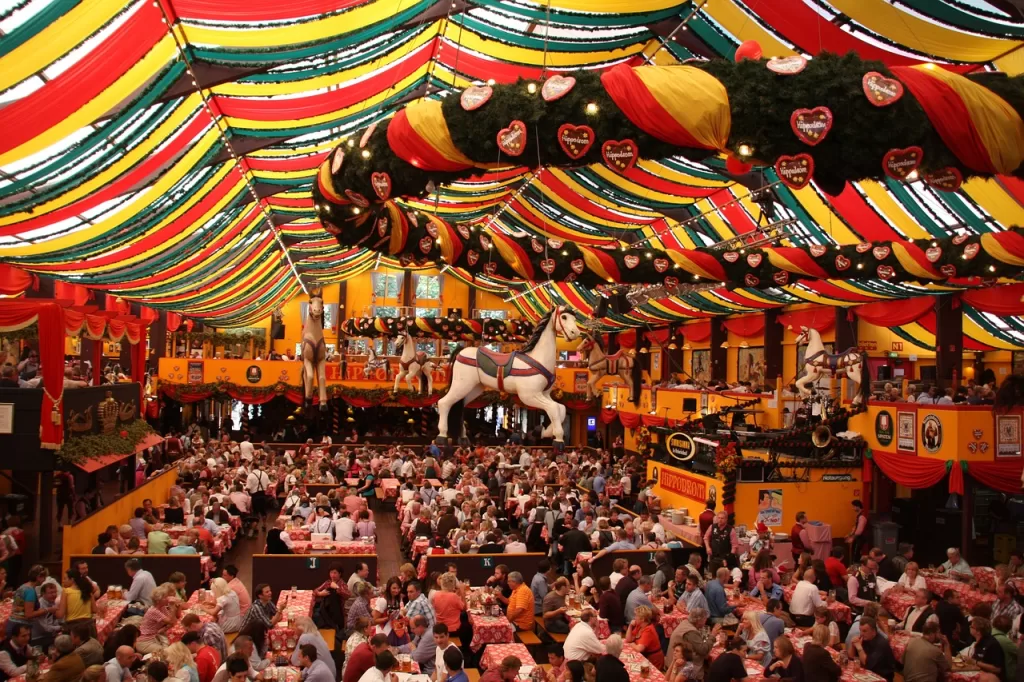
Last but not least on the top European Festivals list is Oktoberfest, it’s the world’s largest Volksfest (beer festival and traveling funfair) held annually in Munich, Bavaria, Germany. It is a 16-day festival running from mid or late September to the first weekend in October, with more than 6 million people from around the world attending the event every year.
The Oktoberfest was first held on 12 October 1810 in honor of the marriage of Crown Prince Ludwig of Bavaria to Princess Therese of Saxe-Hildburghausen. All citizens of Munich were invited to attend the festivities held on the fields in front of the city gates. Horse races, in the tradition of ancient Roman cavalry games, concluded the event. The decision to repeat the festivities and horse races in the subsequent year gave rise to the tradition of the annual Oktoberfest. Over time, Oktoberfest evolved from a horse race event into one of the world’s largest and most famous beer festivals.
Some key changes included:
- In 1811, an agricultural show was added to boost Bavarian agriculture. This led to the festival being scheduled earlier in September to take advantage of nicer fall weather.
- Later, in 1812, the first carousel and two swings were set up as carnival attractions, establishing Oktoberfest as a Volksfest.
- In 1816, carnival booths appeared offering food and games.
- In 1818, the first beer tents and beer gardens opened, replacing the earlier wooden stands. This launched the core tradition of beer drinking at Oktoberfest.
- In 1850, the statue of Bavaria was constructed. This became the festival’s emblem.
- In 1881, electric lighting was introduced to allow the festivities to continue into the night.
- In 1887, the Entry of the Oktoberfest Hosts was introduced, marking the official opening of Oktoberfest with a twelve gun salute.
So while its origins were in 1810 as an event honoring a royal wedding, Oktoberfest grew over the 19th century into the beer-centric festival we know today. The festival now runs for 16-18 days until the first Sunday in October, with over 6 million visitors enjoying Bavarian beer, food, and festivities.
Bonus: White Nights Festival (St. Petersburg, Russia)
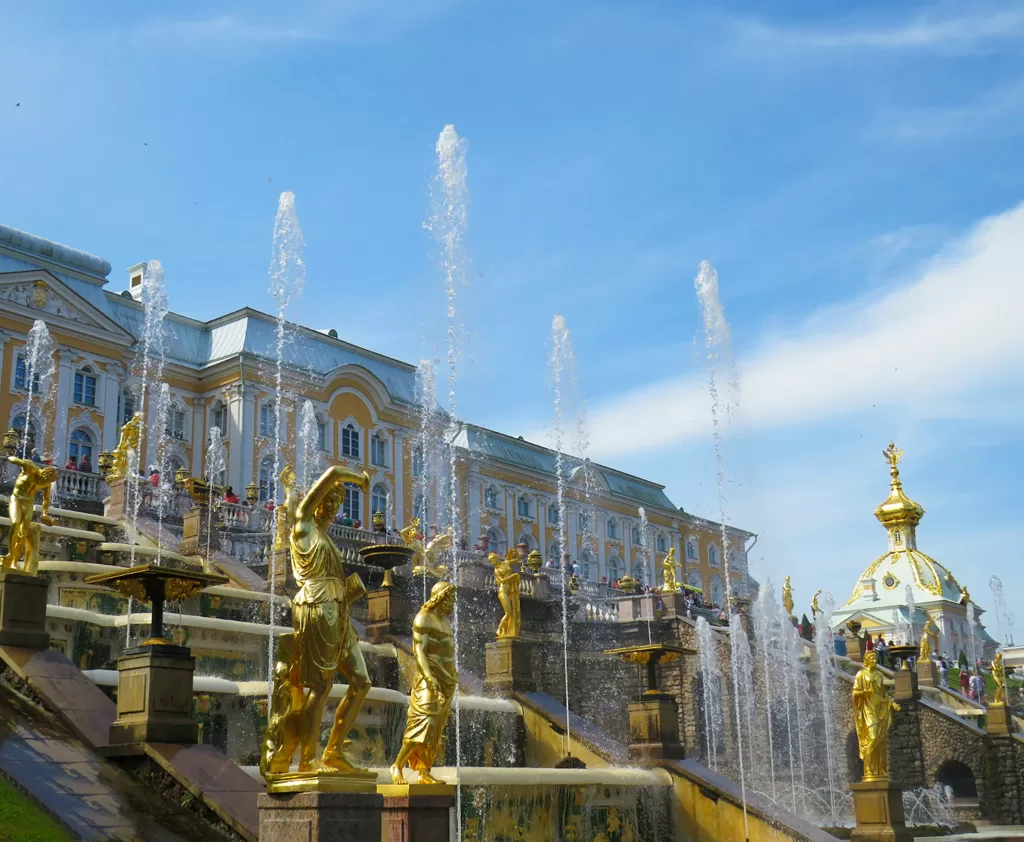
I included the White Nights Festival in St. Petersburg, Russia in my top European Festivals for its enchanting atmosphere and cultural significance. Although it may not be advisable for Americans to visit due to travel restrictions and the region’s Level 4 “Do Not Travel” rating as of Feb 2024.
The White Nights Festival takes place every summer in St. Petersburg, Russia during the period of the midnight sun. From late May to early July, the northern city experiences nearly 20 hours of daylight per day. This phenomenon inspired the White Nights arts festival, which commemorates the eternal daylight with various cultural events.
The festival originated in 1993 on the 300th anniversary of the founding of St. Petersburg. It was meant to showcase the beauty of the city during the precious weeks of white nights. Today, the festival has grown into one of the biggest cultural events in Russia, attracting over 3 million visitors each year.
The nearly month-long celebration transforms St. Petersburg into an epicenter of the arts. Theater performances, opera, ballet, classical music concerts, art exhibits, and jazz festivals animate the evenings. Major venues like the Mariinsky Theatre host acclaimed Russian talent alongside international stars. As the sun hovers near the horizon late into the night, locals and tourists alike enjoy strolling the streets and embankments, soaking up the magical atmosphere.
No matter when visitors attend, there is always something spectacular happening during the White Nights Festival. The glittering imperial city truly comes alive under the glow of the midnight sun.
Conclusion
Europe is home to an incredibly diverse and exciting festival culture. From the world-famous carnival in Venice to the raucous tomato fight of La Tomatina, Europeans know how to throw a good party. The festivals highlighted in this article provide just a small taste of the cultural celebrations that take place across Europe each year.
While the specific traditions and origins of each festival vary, they all share a common spirit of revelry, community, and cultural heritage. For visitors and locals alike, Europe’s festivals offer the chance to experience the region’s many cultures in an immersive and vibrant way. Attending a European festival often provides once-in-a-lifetime memories that last long after the celebrations have ended.
Whether you dream of dancing in the streets of Spain, cheering on whisky-chugging Scots, or joining in the massive crowds at Oktoberfest, Europe undoubtedly offers some of the world’s best festivals. These celebrations showcase the diversity and richness of European traditions while bringing people together in joyous revelry. From Edinburgh to Pamplona and beyond, Europe’s festivals are the lifeblood of local culture and identity, passed down through generations over centuries. For the cultural traveler looking to experience the heart and soul of Europe, attending one of its many festivals promises an unforgettable adventure.
Plan your trip with ease by visiting our Accommodation and Transportation pages. Discover unbeatable deals for seamless and unforgettable adventures!